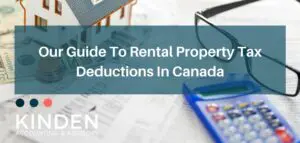Being a small business owner, entrepreneur, or independent contractor, is challenging enough as you have so many added responsibilities and usually a small staff to take care of it all. This means that most small business owners have to handle almost every aspect of their business themselves including major departments such as sales, purchasing, customer service, accounting, HR, finance, and much more.
Taking care of all of these things together can be too much for any one person to handle, and in most cases, those who try often end up losing out on opportunities to expand and grow their business. It is important for any business owner to recognize what they can manage themselves and what can be managed by others. Having a team that one can rely on is the secret to achieving success and growth in any business.
Taxation In Canada
For a small business owner or someone who is self-employed and lives in Canada, proper knowledge of small business accounting and finance is of vital importance. Did you know that the average Canadian small business owner pays approximately 42% of their income in taxes? That is a huge chunk of your income (nearly half of it) that could otherwise be used to grow your business or saved for future use.
No one wants to pay more than their fair due when it comes to taxes. This is especially true in Canada where tax rates are already quite high compared to our neighbors in the South and most countries around the world. Having a progressive tax system generally implies that the more you earn the more you end up paying in tax.
The Canada Revenue Agency (CRA) overlooks and administers all tax laws for the government of Canada. The CRA also offers plenty of tax-based information related to small business bookkeeping, as well as, detailed information regarding Canadian accounting standards and accounting policies on their website. However, if you are someone who is not an accountant or good with finance all that information can seem like utter gibberish. Quite a lot of that information may not even pertain to your particular business and siphoning through it all can take endless time and energy; which small business owners can seldom spare.
Certain tax-laws apply only to certain businesses or are only permissible under certain conditions. Knowing what is permissible and what isn’t, especially, when it comes to tax deductibles, is often beyond the knowledge of most small business owners. Thus, in many instances, those who are self-employed can often overlook even the most basic of tax deductibles that can end up saving the business a substantial sum of money and help improve the bottom line.
5 Tax Deductions That Small Canadian Businesses Can Often Overlook
Tax deductibles such as utilities, office maintenance and repair, rent, and employee wages are common knowledge amongst business owners. After all, these expenses directly contribute to the cost of running the business and are pretty self-explanatory. But they are other tax deductibles that you may not know of.
Advertising & Promotional Expenses
Did you know that you are permissible to deduct all types of advertising and promotional expenses in Canada whether that be online or in print form? This is why it is important to keep track of all your advertising and promotional expenses. Whether you are spending money on Canadian TV ads, magazines, radio stations, local newspapers, or giving out promotional material at seminars or conventions; all of these costs are tax-deductible under Canadian tax laws.
Donations To Charitable Causes
Giving a percentage of your income to charitable causes is not only the noble and generous thing to do but it is also tax-deductible. This means that if you are donating money to a registered Canadian charity that issues receipts, for example, Plan Canada or the Red Cross, you can save those receipts and submit them when you file your return at the end of the year.
Bad Debt
While running a business there is always the risk of accumulating bad debt. It is often considered by small business owners as a risk of doing business. But is this really the case? Canadian tax-laws protect small business owners from some of the risks associated with bad debt. However, not all bad debt is eligible. For example, mortgage debt and debt accumulated as a result of a conditional sales agreement are not applicable for a tax deduction. However, a bad debt arising as a result of non-payment for products or services sold is applicable for a tax deduction. For more information on this, you can seek the services of a Canadian accounting consultant or a local accounting firm in your region.
Home-Based Business Expenses
What if you are self-employed and running your business out of your home or garage? Can you deduct a portion of your rent, utilities, and other home expenses from the CRA? Well, the answer is yes and no. If you run your business out of your home then there are some expenses that do become tax-deductible. The most common of which are mortgage interests and property taxes. However, you can not claim all of it. Under CRA regulations you have to determine the exact square footage of your home that is being used explicitly for your business and no other purpose. Whatever that percentage equates to can be deducted and claimed back which translates to more disposable income for you!
Accounting & Legal Fees
Many small business owners do not seek the services of top accounting firms in Canada simply because they believe it would cost them money which they could easily save by simply doing the year-end taxes themselves. What they fail to realize is that a general accountant or for that matter even a financial accountant can find many avenues that can result in you paying less tax or getting a better tax return. The cost of their accounting services is often off-set by the gains you make by hiring their expertise alone. However, under Canadian tax law, any accounting and legal fees incurred by the business are also tax-deductible. This means that by not seeking the help of a professional accountant you actually stand to lose money!
Conclusion
As a small business owner, you already have a lot on your plate. By hiring the services of a business tax specialist or a well-reputed Halifax accounting firm you can relax knowing that your taxes are being done efficiently, accurately, and in your best interest. This will allow you the luxury to focus on other aspects of your business to help it grow and become more successful.



